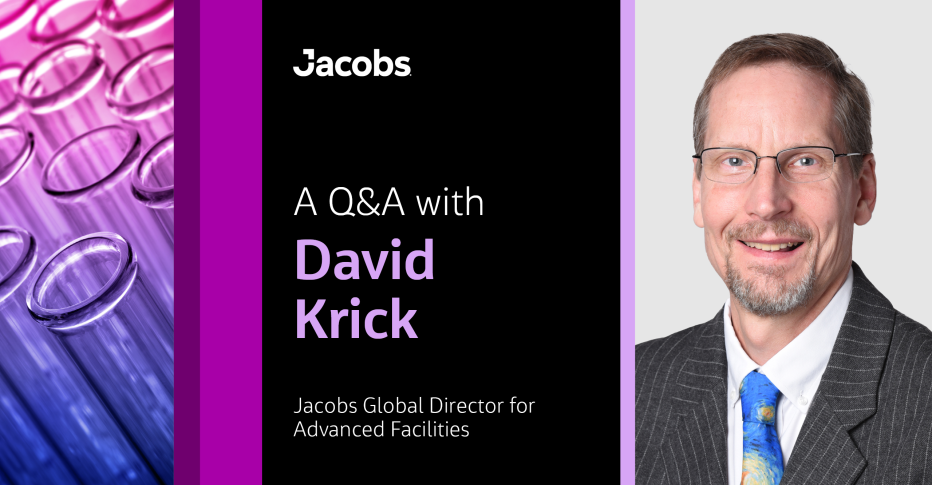
From phones and computers to electric vehicles and data centers, semiconductors are the core of modern technology. Our clients are navigating complex market trends and need to respond adeptly and keep pace with global demands.
Jacobs helps clients around the world, offering unique insight into advanced planning and a full suite of project delivery capabilities, enabling them to focus on technological advances and accelerate their manufacturing goals.
In this Q&A, we connect with Jacobs Global Director for Advanced Facilities, David Krick. David’s role is critical on the front of projects where he serves as a bridge between the client and Jacobs’ delivery team. He shares his perspectives on the challenges of the dynamic market and how we can think differently about the project life cycle and client end goals.
Tell us a bit about your role as a Global Director for Advanced Facilities and how it’s helping us deliver more for our clients.
I specialize in the electronics, data centers, and electric vehicles markets, while supporting other emerging manufacturing technologies as part of our Advanced Manufacturing business, which is a strategic growth area for Jacobs. If I had to distill my role into three main activities, it would be helping clients articulate their project goals, driving collaboration across our delivery teams and supporting training and mentoring. I typically work with new clients, getting involved at the front end of their projects. I work closely with them to understand their manufacturing and technology plans and convey them in terms that our design teams understand. In other words, I'm like the decoder ring between project executives on the client side and our technical staff on the Jacobs side who are going to deliver the work.
What are some of the biggest challenges the industry is facing?
Advanced manufacturing markets can be very cyclical with multiyear boom-and-bust periods. We’re constantly trying to navigate the dynamics of the industry when it comes to supply and demand so we can respond more adeptly. When the market is thriving and we see an influx of very large and complex projects, our biggest challenge is resourcing. We lean on other parts of the business and leverage our global delivery centers to scale up our teams to deliver these gigafactories. India is a great example of our ability to scale up our teams. Our India offices can hire more people, and faster than we can here in the United States, simply because they have far more graduates in relevant STEAM (Science, Technology, Engineering, Arts and Math) disciplines. So, we’re developing a solid partnership with that team. We’ve already established a similar partnership with a delivery team in Poland. It's great having this network of global talent that we can tap into, which reinforces our cross-businessapproach. There are very few companies on the planet that can match that level of talented employees — and that’s one of our silver bullets.
How do you help clients think differently about their projects?
I spent the first half of my career on the client side so I understand the market trends as well as the decision-making process when it comes to projects, and I can speak to both client and Jacobs’ delivery sides credibly. A typical client goal in this business is cost-effective speed-to-market deployment of manufacturing capacity. They want to go as fast as possible, but they don’t always have the full picture when it comes to advanced planning. Certain planning steps feed into facility design and construction, which can be further complicated and intertwined when it comes to technology decisions. New clients sometimes don’t understand the level of detail that an engineering firm needs to deliver a facility design at a velocity that the market requires. So, I work with those clients to provide more context about the project sequence and which the order in which critical decisions are needed — what they’re going to manufacture, how much space they need, what utilities they require, and when — to meet their manufacturing goals.
What are some emerging trends and where do you see the industry heading?
We’re already way ahead of others when it comes to certain technologies like digital twinning and 3D design and automation, but other areas like artificial intelligence (AI) are still in their early infancy and it’ll be a while before we see a major impact on certain advanced manufacturing clients. That’s what I love about the semiconductor industry — it changes constantly. Despite the boom-and-bust cycles, the industry has consistently grown over the last five decades. Technological and manufacturing advancements enable new products and new clients, so there’s always something new and exciting happening in the industry. It’s an interesting place to be a technologist and I learn something new every day.
Is there a project or initiative you’re particularly proud of?
One initiative I’ve been involved in and proud of is expanding our advanced manufacturing business in India, specifically the semiconductor industry. That industry is in the early stages of growth there, but it has strong government support and a huge appetite for domestic semiconductor products. Over the last two years, I've spoken at multiple technical conferences there about the challenges (and rewards) of building a robust semiconductor manufacturing supply chain and ecosystem in a new region and have been assisting our Delhi office to assemble and train a semiconductor delivery team. The whole process, as well as the success we’ve had already, has been gratifying. That also ties into our global delivery method, and I’m excited to see that sort of teambuilding and what it enables us to do. We’ve won multiple projects, including most recently, a joint venture on a new Outsourced Semiconductor Assembly and Test facility at Sanand, Gujrat in India. I see a bright future for India and am excited to be a part of building a semiconductor delivery “engine” in India.
About the interviewee

As the Global Director for Advanced Facilities at Jacobs, David Krick assists advanced manufacturing clients for some of the world's largest and most technically advanced semiconductor manufacturing and data center facilities. He has held a variety of technical program management roles with Jacobs and in his previous role on the client side. David also has experience managing complex state-of-the-art research and development programs. As an infinite learner, David is passionate about coaching and mentoring. When he’s not working, David enjoys spending time with his family, being outdoors with his two greyhounds, and spending quality time on one of his many bicycles. He holds an advanced degree from Penn State, has been an invited speaker at countless technical conferences, and holds four patents.












































